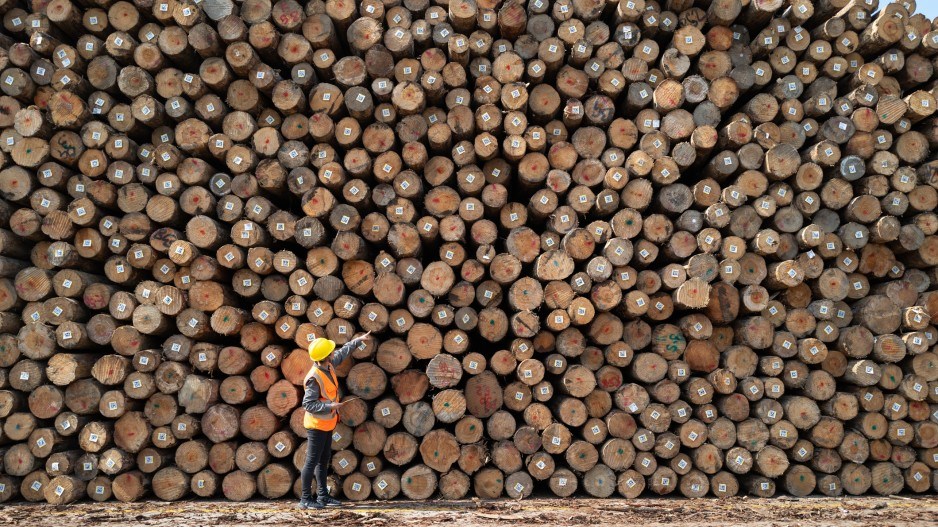Considerable attention has been devoted to the potential imposition of a 25 per cent tariff on all Canadian goods by the United States. Regardless of the current pause on that threat, tariffs of that size and potential scope pose a profound threat to British Columbia’s economic stability, exacerbating the already precarious position of the province’s forest sector.
The longstanding softwood lumber dispute, wherein the U.S. persistently alleges B.C. subsidizes its lumber industry already has the Americans imposing a 14.4 per cent duty on B.C. lumber, so an additional 25 per cent tariff could prove catastrophic, triggering layoffs, mill closures and economic turmoil in forestry-dependent communities. Furthermore, the forest sector as with the other resource sectors and manufacturing sectors of this province face regulatory and tax constraints making for challenging condition even before Trump’s 25 per cent tariff.
Historically, Canada has prevailed in most legal disputes concerning softwood lumber through rulings by the World Trade Organization and under NAFTA/USMCA agreements. Yet, the United States continues to find fault with Canada and force softwood lumber duties by leveraging its domestic trade laws. Given the escalating risk of a full-scale trade war, British Columbia must adopt innovative and assertive countermeasures to safeguard its forest sector. These measures are emergency response actions to address the regulatory and tax regime in B.C. and, while temporary, some could have long-term benefits after the tariffs are gone.
The B.C. forest sector is one of our most important export industries, generating over $17.4 billion in GDP and sustaining tens of thousands of jobs in 2023. It is especially important for the economies of rural and Indigenous communities throughout the province. The film industry, much smaller in comparison, recently received a 36 per cent tax credit to attract more major productions and address residual impacts faced by the industry from the pandemic, labour disruptions and changes to industry practices. Arguably, the threat of U.S. tariffs to one of B.C.’s major export industries is far more consequential. Why not offer a similar tax credit to all businesses within the B.C. forest sector—including contractors, tenure holders, licensees and manufacturers—for the duration of U.S.-imposed tariffs? Such action would provide critical financial relief, enabling businesses to withstand the pressures of U.S. protectionism and maintain operations.
Given the potential for widespread sawmill closures, British Columbia must actively seek alternative markets, particularly in Asia. Furthermore, in such extreme times as the province faces, consideration of less politically popular exporting opportunities may need to be explored.
Temporarily eliminating fee-in-lieu charges on unmanufactured log exports would provide forest licensees with revenue opportunities, ensuring continued harvesting to support flows of logs and residuals to pulp mills and non-U.S.-reliant manufacturers to maintain production. The intention should be to deliver policy that preserves employment in the logging and transportation sectors.
Government could also support the sector by eliminating the provincial sales tax where applicable on logging equipment, lubricants, parts, trucks and fuel costs for forestry-related transportation. The repeal of the carbon tax and other fuel consumption-related taxes would further reduce the financial burden on an industry already struggling to remain competitive in global markets.
Consistent with the provincial government’s commitment to strengthening the economy, British Columbia could look to pause, for now, the introduction and implementation of new environmental and forestry policies that would further increase operational costs to a time when the industry has more ability to focus on absorbing such changes.
The regulatory landscape—particularly regarding cutting and roadbuilding permits—remains overly complex, impeding industry’s ability to access economic fibre. Effort should be focused on permit development requirements and approval processes rather than undertaking yet another forest review as proposed by the recent agreement with the Green Party. Over the past decade, numerous in-depth reviews have been conducted. For now, the priority must shift from regulatory overreach to industry survival with so many jobs across the province at stake.
Given the government’s constrained fiscal position, increased public spending is not a sustainable solution. Should the tariff lead to potential mass unemployment, rather than promising financial aid for displaced forestry workers, the province should direct that workforce and funds to maximize benefits to the province through a job creation program centred on proactive wildfire mitigation efforts. Redirecting labour into forest fuel reduction and fire prevention would not only provide stable employment but also enhance forest management practices, mitigating the risks of future environmental disasters.
It is imperative to emphasize that aside from the last suggestion, none of these proposals require direct financial handouts from the provincial government. Instead, the focus should be on targeted regulatory relief and cost reductions, ensuring business continuity and workforce stability.
British Columbia now faces a critical juncture — either accept mass unemployment and economic stagnation, or implement bold, temporary measures to keep the proverbial lights on for its forest sector. A decisive and calculated response is not just desirable, it is essential for the long-term sustainability of B.C.’s economy and the forest sector, in particular.
David Elstone is managing director of Spar Tree Group.
Denise Mullen is director of environment, sustainability and Indigenous relations at the Business Council of B.C.




